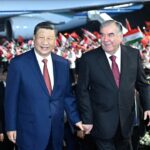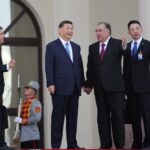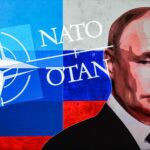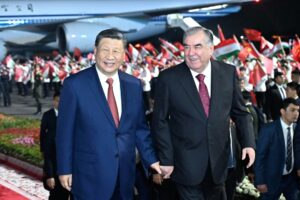Curators and artists at the renowned documenta fifteen exhibition faced a torrent of denunciations, including from German officials, for hosting Palestinian collectives and exhibits on Palestine solidarity.
For months prior to opening day, documenta fifteen — the 15th edition of one of the world’s largest art festivals — had been the subject of a major smear campaign by the German media. Held from June 18 until Sept. 25 in Kassel, Germany, the festival’s organizers were accused of antisemitism, primarily relating to issues around Palestine-Israel, leading many artists involved to believe the quinquennial exhibition was doomed from the very start.
Documenta fifteen was the first edition of the event to be curated mostly by artists from the Global South. Ruangrupa, a Jakarta-based artists’ collective, was selected to curate this year’s exhibits, and chose to do so based on the core values of lumbung — the Indonesian term for a communal rice barn — placing a strong emphasis on collectivity, communal resource-sharing, and sustainability.
While Palestine-Israel played a marginal role in the months-long exhibition, ruangrupa faced a torrent of criticism, including from German political officials, for showcasing allegedly antisemitic collectives, as well as pressure to shut down an exhibit by Palestinian artists.
Indeed, with the acrimony over the participation of Palestinian artists in the festival beginning before it opened in June — along with threats to, and campaigns against, the artists themselves — it was not altogether clear before the festival opened whether it would be safe for them to share their work.
A tsunami of allegations
In January 2022, a blog post appeared online leveling allegations of antisemitism at the curators and several artists who were due to exhibit at documenta fifteen. Named “Alliance Against Antisemitism Kassel” despite seemingly being run by only one person, the blog is linked to the Antideutsche (“anti-German”) movement, which is historically part of the country’s radical left yet holds strong pro-Israel views.
The post condemned the invitation of the Palestinian collective “The Question of Funding” (TQoF) to documenta fifteen, accusing the artists of being Nazi sympathizers because they had previously served in leadership positions at the Khalil Sakakini Cultural Center, a prominent arts and culture nonprofit organization based in Ramallah, in the occupied West Bank.
The accusations centered on the claim that Khalil Sakakini, a progressive Palestinian educator and nationalist leader active during the first half of the 20th century, was himself an antisemite and supporter of Nazism, on the basis of false and decontextualized quotations from Wikipedia. Despite these claims having been debunked by Palestinian historiography, journalists, and the Israeli historian Tom Segev, the Palestinian artists invited to documenta — such as Yazan Khalili who managed the Center in 2015 — were nonetheless depicted as antisemitic simply by association with Sakakini’s name.
The blog also accused the artists of “promoting hatred of Israel” after some of the artistic team, including Khalili, were among the signatories to an open letter arguing that the German Parliament’s 2019 anti-BDS (Boycott, Divestment, and Sanctions) resolution constitutes a threat to artistic freedom and freedom of speech. Numerous German media outlets picked up the story and repeated the blog’s claims without question.
Elsewhere, TQoF was accused of antisemitism for exhibiting Mohammed Al-Hawajri’s “Guernica Gaza” series, which adapts famous works of European art — including Picasso’s Guernica, which portrays a Nazi bombing during the Spanish Civil War — to depict Israeli military violence against Palestinians.
Documenta’s curators, ruangrupa, responded to these allegations in May, saying the media onslaught was a “bad faith attempt to delegitimize artists and preventively censor them on the basis of their ethnic heritage and presumed political positions.” They added: “The attempt to smear individual Palestinian artists as anti-Semites, either directly or by way of ‘guilt by association,’ is precisely the kind of character assasination [sic] often seen in extreme-right and right-wing discourse.”
At the same time, ruangrupa did acknowledge an incident of antisemitism that was unrelated to the Palestinian artists. “People’s Justice,” an installation by the Indonesian artist collective Taring Padi, showed illustrations of figures containing traditional antisemitic tropescontained figures with stereotypical antisemitic characteristics such as a soldier with a pig’s face and a star of David, and a man with payot (sidecurls) and sharp teeth. The painting had hung on a scaffold in the center of Kassel before it was taken down.
“We apologize for the disappointment, shame, frustration, betrayal, and shock this stereotype has caused the viewers and the whole team,” ruangrupa said in a statement. “The truth of the matter is that we collectively failed to spot the figure in the work, which is a character that evokes classical stereotypes of antisemitism. We acknowledge that this was our error. In consultation with Taring Padi we are in support of the decision to take down the work in relation to their principles and values: to work in close contact with citizens in respect of differences, including every ethnic group and religion.”
The Palestinian artists, however, continued to be targeted. Looking back on the “tsunami” of allegations, Khalili told +972 that it was “very hard on me and on TQoF.” But things would soon get worse.
Later that same month in May, unidentified perpetrators broke into TQoF’s exhibition space at documenta fifteen, coated its walls with the contents of a fire extinguisher, and sprayed “187” — the section of the California Penal Code that refers to murder, and which is sometimes adopted as a coded death threat. The name “Peralta” was also sprayed on dozens of surfaces, believed to refer to Isabel Peralta, a Spanish fascist activist who was recently denied entry into Germany because of her neo-Nazi views.
“At that moment, I think it shocked many of us and much of the German public that these smear campaigns are actually real, and they can lead to attacks,” said Khalili. “We responded to these campaigns by saying that the baseless repetition of lies as fact leads to real danger.” Nonetheless, German President Frank-Walter Steinmeier — who opened the festival this year — began his remarks by condemning the Palestinian artists and documenta curators.
“I followed the discussion prior to this documenta very closely, about what we must expect from art, and also about the, at times, thoughtless and reckless approach to the State of Israel,” Steinmeier said, adding that “recognizing Israel is the basis and precondition of this debate.” He slammed the fact that “apparently no Jewish artists or artists from Israel” were present at the festival, before criticizing “representatives of the Global South” for boycotting events featuring Israelis.
According to Lara Khaldi, a Palestinian cultural worker and member of documenta fifteen’s artistic team, the Palestinians attending the festival were “shocked” at the president’s intervention. “We were actually anticipating that he would apologize for the maltreatment of some groups in Germany toward us, for the racism that other colleagues have also experienced, rather than encourage it and make us vulnerable to even more slander,” she said. “We did not feel safe at any point in this experience.”
‘Historical propaganda’
The accusations of antisemitism at documenta fifteen also extended to the Ramallah and Brussels-based Palestinian collective Subversive Film (SF). The project that came under scrutiny was “Tokyo Reels” — a set of freshly restored films originally made between the 1960s and ’80s that explored Japanese and Palestinian anti-imperial solidarity. SF, a cinema research and production collective that aims to cast new light upon historic works related to Palestine and the region, exhibited Tokyo Reels throughout the entire festival.
In their first in-depth interview since the documenta affair, SF told +972 Magazine why the materials from Japan are so important, and why they adamantly reject the antisemitism allegations.
The project originated in 2019, while SF was screening their film “Off Frame aka Revolution Until Victory” in Japan. A woman in the audience approached SF members Reem Shileh and Mohanad Yaqubi, handed them a note, and asked to meet them before they left the country. After a quick translation, they realized it was about a list of films she had in her possession — some of them known to SF, others not.
A few days later, the woman handed SF a box with 20 film reels, U-matic tapes, books, posters, and other documents depicting a history of Japanese political mobilization and solidarity-making with Palestine. The films were made by Palestinian, Arab, Japanese, and American filmmakers and journalists, and were commissioned by various political bodies, television stations, and the United Nations Relief and Works Agency (UNRWA). The materials were collected by a Japanese solidarity group throughout the 1970s and into the ‘80s, which has long since dissolved, but its former members safeguarded the collection for over three decades.
SF’s goal with Tokyo Reels was to reflect on how transnational “militant cinema,” which stretches back to the 1960s, could be unearthed and restored. This undertaking is especially difficult with Palestinian films, as many materials were either destroyed during wars or locked away in the Israel State Archives, inaccessible to Palestinian historians and artists.
For example, nearly all of the images and films from a massive archive in Lebanon were confiscated when the Israeli army raided the offices of the Palestinian Liberation Organization (PLO) in Beirut during its 1982 invasion. Some films that were later discovered by SF and shown at documenta were sent in batches from the PLO office in Beirut to Japan between 1967 and 1982; how the materials arrived there remains unknown to this day.
A preliminary report released in September, authored by a “scientific advisory panel” handpicked by documenta’s shareholders to investigate antisemitism at the festival, recommended that Tokyo Reels be shut down. The panel claimed the films are “laced with anti-Semitic and anti-Zionist fragments” and constituted “historical propaganda” that glorifies terrorism. The committee also accused SF of not contextualizing the archival films in order to correct their “historical misrepresentations.”
Although there were seven academics listed in the investigation committee, only five of them were signatories to the report. Dr. Nicole Deitelhoff, the chair of the committee, did not respond to +972’s request for comment. In the wake of the panel’s report, Germany’s Minister for State and Culture, Claudia Roth, also called for Tokyo Reels to be shut down, saying she agreed with the committee’s findings.
“We wanted to firstly understand the history of these solidarity movements and be able to show the world that there is an existence of such a memory,” SF’s members told +972, adding that the documenta advisory committee had clearly misunderstood the value of the archival films. “This report itself was not scientific,” they continued. “It was clear they did not thoroughly study what Tokyo Reels was about.”
Khaldi, of documenta’s artistic team, believes the committee was heavily biased against anything remotely supportive of Palestinians. “From the language of the preliminary report, it seems the committee was looking toward the media, rather than at the art works,” she told +972.
“These films are archival, they cannot be edited, they cannot be changed,” she continued. “SF only explained the context in which these films were made as Palestinian cinema was looted from history. Militant cinema is a very well-known and popular academic genre within film studies. In my opinion, it is SF that are the scientists in this field, not those involved in the investigation committee.”
SF also believes that the committee’s demand for contextualization is a smokescreen for articulating a specific opinion that pleases the mainstream German discourse. “[It’s] ridiculous,” they said. “For the panel of ‘experts,’ their idea of contextualization is dismissing these films as only propaganda. It doesn’t matter to them that we did in fact contextualize the archives, [because] it wasn’t in the way that they wanted.”
Khaldi argues that, in fact, the recommendation to shut down Tokyo Reels was an insult to the German public’s ability to engage in a constructive conversation about the films. “The premise to shut down a historical installation is patronizing,” she said. “[Germans] should be able to decide, question, and engage with the artwork themselves instead [of] being dictated [to] by political actors.”
SF, along with many of documenta’s artists, collectives, and curators, released a statement criticizing the establishment of the scientific advisory panel. “We are angry, we are sad, we are tired, we are united,” the statement read. Its signatories categorized the report as a racist attempt at censorship, calling it “vicious” and “problematic.”
In their statement, documenta’s artists also criticized the committee’s use of the controversial International Holocaust Rememberance Alliance (IHRA) definition of antisemitism as a justification for their allegations. IHRA has been widely criticized by many activists and scholars as being a very broad definition that cites criticisms of the Israeli state as an example of prejudiced and antisemetic behavior.
“The scientific advisory panel creates a framework that sets up an inevitable condemnation of the lumbung, its structure, Palestinian artists and their works, and ultimately documenta fifteen as a whole,” the statement read. “What kind of academic integrity purposely ignores history and facts in service of racist and hegemonic agendas?”
Germany’s climate of repression
Charlotte Wiedemann is a journalist and writer who focuses on race relations and postcolonial thought, and the author of a recent book on Holocaust remembrance emphasizing the need to include non-European perspectives. Wiedemann likened the documenta affair to previous instances in which unmerited accusations of antisemitism have infringed on freedom of expression in Germany, severely damaging public discourse and the necessary fight against real antisemitism.
“In my view, there was one certain antisemitic image, which was rightly removed,” Wiedemann told +972, referring to Taring Padi’s installation. “So the debate was grossly and deliberately overstated, apparently for political means: to delegitimize voices who are critical of Israel’s occupation policies and human rights violations.”
Alice Garcia, legal advisor to the European Legal Support Center, also warned of the impact of these accusations. “The debates and attacks on the documenta fifteen exhibition illustrate the extreme climate of repression in Germany, not only against Palestinian rights advocates, but also against any individual or collective, including artists, who express a narrative differing from the mainstream Western discourse on Palestine-Israel,” Garcia said in a statement to +972.
German journalist Hanno Hauenstein, who has meticulously covered the documenta scandals, suggested that the trajectory of the German discourse on antisemitism partly mimics conservative attacks on critical race theory in the United States. “What we’re seeing is in part a white liberal reaction to this ‘racial reckoning’ and epistemic revolution of movements such as Black Lives Matter and postcolonial theory that call out institutional racism,” he told +972.
Although the campaigns against documenta fifteen artists claimed to be fighting antisemitism, which in and of itself would be a commendable goal, Hauenstein believes that they were nonetheless evidence of a dangerous double standard in Germany’s art world that serves to silence Palestinians while erasing the dark history of some German artists. “You could argue that when it comes to the personal relationship with our own families, especially the rich families of Nazi [descendants], there has [not] been a lot of introspection, or real consequences,” he said.
One example is that of the German billionaire art collector Julia Stoschek, who has long ignored the Nazi legacy of her great-grandfather Max Brose, and has even defended it in recent interviews. In the Kassel Museum for Sepulchral Culture, meanwhile, a figure called “Death and the Jew,” depicting the murder of Jesus by a Jewish man without any description or context, is still displayed in the museum.
Moreover, the Online Collection of the Dresden State Art Collection — whose director Marion Ackermann was appointed to be part of the scientific expert committee that later claimed there was “an anti-Zionist, anti-Semitic and anti-Israel sentiment” at documenta 15 — contains several antisemitic drawings, dolls, and texts by German artists of the 20th century. Most of those pieces can still be viewed online, and, up until recently, were on digital display without any commentary.
“There is a mostly unconscious mechanism at play here,” Hauenstein told +972, “[through which] people are very much emphasizing the antisemitism of ‘foreigners,’ or so-called others — people who are considered to be somewhat deviant from German identity — while at the same time, in-bred German antisemitism of the likes of Hans-Georg Maaßen [a former president of the Federal Office for the Protection of the Constitution] or Thilo Sarrazin [a politician and former banker] is often ignored or rarely even criticised.”
‘The media is not the only judge’
The campaign targeting the festival’s organizers has shown no signs of stopping, despite the fact that the exhibition ended last month. Severe pushback has emerged in October against the decision by Hamburg University of Fine Arts (HFBK) in January to award guest professorships to ruangrupa’s Reza Afisina and Iswanto Hartono, with members of the public, politicians, and the media calling to revoke the decision on grounds of antisemitism.
A parliamentary committee from the center-right Christian Democratic Party (CDU) even asked the university’s president, Martin Köttering, to provide written proof that the pair are not antisemitic. “The HFBK should have pulled the ripcord in the summer,” said Anke Frieling, science policy spokeswoman for the CDU parliamentary group. “Artistic freedom does not extend to antisemitism,” she added, citing a pro-BDS resolution and criticisms of Israel as evidence for her allegations.
At their first public event as visiting professors earlier this month, Afisina and Hartono addressed the audience: “We would like to make it very clear to all Hamburg residents: we are not antisemites. We are not enemies of the State of Israel. We want to stand up against racism, discrimination, violence, and oppression of people all over the world,” they said.
This was not enough to convince many in the crowd, as loud protests erupted in the university lecture hall where protestors called on Köttering to “throw out the Nazis.” Afisina later stated that the pair were “sad to be received in this disrespectful way.”
Despite the smear campaigns, political attacks, and a strong effort to silence documenta’s artists, this year’s festival was still well-attended, exceeding the organizers’ expectations with over 700,000 visitors over the 100 days. Artists and organizers hope that despite the shadow of the antisemitism debate, the audience was able to absorb the exhibits in an impactful way.
“I am confident the audience thought differently,” Khaldi said. “Why is this the second most visited documenta? Because people wanted to see the conversation and debate that is being broadcasted throughout the country, and then decide for themselves. In the end, the media is not the only judge.”
From the beginning of documenta, the lumbung community clearly stuck together through the aggressive campaign. They exhibited Palestine solidarity work, were united in their statements, and were unwavering in their support of Palestinian artists under attack. “The most important part of the 100 days of documenta was that the artists kept the unity,” SF told +972.
“There were so many attempts to divide us and have individual collectives even denounce us, and thankfully that did not happen,” they continued. “This allowed us to survive the onslaught until the end and somehow keep all of our exhibits running. Unity of the Global South was definitely the biggest lesson coming out of this.”
At their first public event as visiting professors earlier this month, Afisina and Hartono addressed the audience: “We would like to make it very clear to all Hamburg residents: we are not antisemites. We are not enemies of the State of Israel. We want to stand up against racism, discrimination, violence, and oppression of people all over the world,” they said.
This was not enough to convince many in the crowd, as loud protests erupted in the university lecture hall where protestors called on Köttering to “throw out the Nazis.” Afisina later stated that the pair were “sad to be received in this disrespectful way.”
Despite the smear campaigns, political attacks, and a strong effort to silence documenta’s artists, this year’s festival was still well-attended, exceeding the organizers’ expectations with over 700,000 visitors over the 100 days. Artists and organizers hope that despite the shadow of the antisemitism debate, the audience was able to absorb the exhibits in an impactful way.
“I am confident the audience thought differently,” Khaldi said. “Why is this the second most visited documenta? Because people wanted to see the conversation and debate that is being broadcasted throughout the country, and then decide for themselves. In the end, the media is not the only judge.”
From the beginning of documenta, the lumbung community clearly stuck together through the aggressive campaign. They exhibited Palestine solidarity work, were united in their statements, and were unwavering in their support of Palestinian artists under attack. “The most important part of the 100 days of documenta was that the artists kept the unity,” SF told +972.
“There were so many attempts to divide us and have individual collectives even denounce us, and thankfully that did not happen,” they continued. “This allowed us to survive the onslaught until the end and somehow keep all of our exhibits running. Unity of the Global South was definitely the biggest lesson coming out of this.”
Source : +972 Megazine















